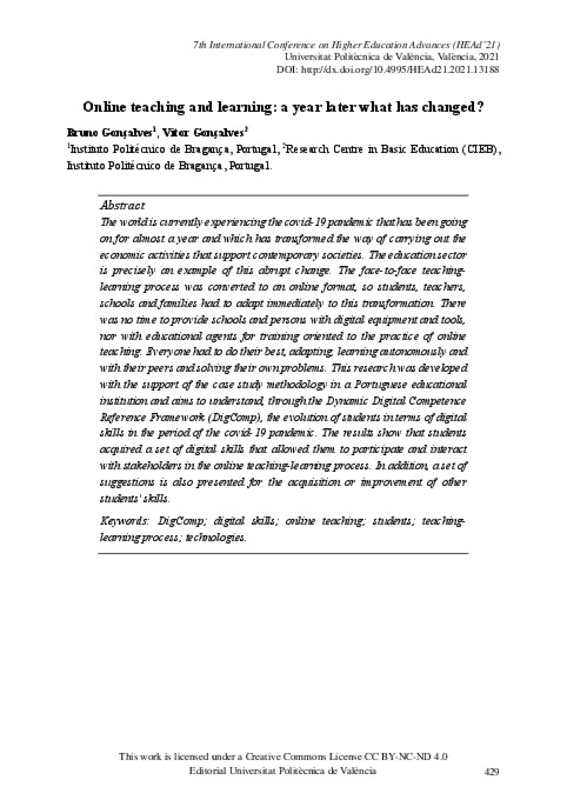JavaScript is disabled for your browser. Some features of this site may not work without it.
Buscar en RiuNet
Listar
Mi cuenta
Estadísticas
Ayuda RiuNet
Admin. UPV
Online teaching and learning: a year later what has changed?
Mostrar el registro sencillo del ítem
Ficheros en el ítem
| dc.contributor.author | Gonçalves, Bruno
|
es_ES |
| dc.contributor.author | Gonçalves, Vitor
|
es_ES |
| dc.date.accessioned | 2021-09-14T07:09:27Z | |
| dc.date.available | 2021-09-14T07:09:27Z | |
| dc.date.issued | 2021-07-26 | |
| dc.identifier.isbn | 9788490489758 | |
| dc.identifier.issn | 2603-5871 | |
| dc.identifier.uri | http://hdl.handle.net/10251/172339 | |
| dc.description.abstract | [EN] The world is currently experiencing the covid-19 pandemic that has been going on for almost a year and which has transformed the way of carrying out the economic activities that support contemporary societies. The education sector is precisely an example of this abrupt change. The face-to-face teaching-learning process was converted to an online format, so students, teachers, schools and families had to adapt immediately to this transformation. There was no time to provide schools and persons with digital equipment and tools, nor with educational agents for training oriented to the practice of online teaching. Everyone had to do their best, adapting, learning autonomously and with their peers and solving their own problems. This research was developed with the support of the case study methodology in a Portuguese educational institution and aims to understand, through the Dynamic Digital Competence Reference Framework (DigComp), the evolution of students in terms of digital skills in the period of the covid-19 pandemic. The results show that students acquired a set of digital skills that allowed them to participate and interact with stakeholders in the online teaching-learning process. In addition, a set of suggestions is also presented for the acquisition or improvement of other students' skills. | es_ES |
| dc.description.sponsorship | This work has been supported by FCT – Fundação para a Ciência e Tecnologia within the Project Scope: UIDB/05777/2020. | es_ES |
| dc.format.extent | 9 | es_ES |
| dc.language | Inglés | es_ES |
| dc.publisher | Editorial Universitat Politècnica de València | es_ES |
| dc.relation.ispartof | 7th International Conference on Higher Education Advances (HEAd'21) | |
| dc.rights | Reconocimiento - No comercial - Sin obra derivada (by-nc-nd) | es_ES |
| dc.subject | Higher Education | es_ES |
| dc.subject | Learning | es_ES |
| dc.subject | Educational systems | es_ES |
| dc.subject | Teaching | es_ES |
| dc.subject | DigComp | es_ES |
| dc.subject | Digital skills | es_ES |
| dc.subject | Online teaching | es_ES |
| dc.subject | Students | es_ES |
| dc.subject | Teaching-learning process | es_ES |
| dc.subject | Technologies | es_ES |
| dc.title | Online teaching and learning: a year later what has changed? | es_ES |
| dc.type | Capítulo de libro | es_ES |
| dc.type | Comunicación en congreso | es_ES |
| dc.identifier.doi | 10.4995/HEAd21.2021.13188 | |
| dc.relation.projectID | info:eu-repo/grantAgreement/FCT//UIDB/05777/2020/ | es_ES |
| dc.rights.accessRights | Abierto | es_ES |
| dc.description.bibliographicCitation | Gonçalves, B.; Gonçalves, V. (2021). Online teaching and learning: a year later what has changed?. En 7th International Conference on Higher Education Advances (HEAd'21). Editorial Universitat Politècnica de València. 429-437. https://doi.org/10.4995/HEAd21.2021.13188 | es_ES |
| dc.description.accrualMethod | OCS | es_ES |
| dc.relation.conferencename | Seventh International Conference on Higher Education Advances | es_ES |
| dc.relation.conferencedate | Junio 22-23, 2021 | es_ES |
| dc.relation.conferenceplace | València, Spain | es_ES |
| dc.relation.publisherversion | http://ocs.editorial.upv.es/index.php/HEAD/HEAd21/paper/view/13188 | es_ES |
| dc.description.upvformatpinicio | 429 | es_ES |
| dc.description.upvformatpfin | 437 | es_ES |
| dc.type.version | info:eu-repo/semantics/publishedVersion | es_ES |
| dc.relation.pasarela | OCS\13188 | es_ES |
| dc.contributor.funder | Fundação para a Ciência e a Tecnologia, Portugal | es_ES |








